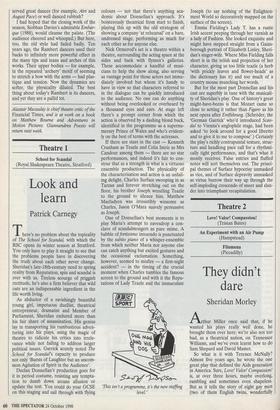Theatre 1
School for Scandal (Royal Shakespeare Theatre, Stratford)
Look and learn
Patrick Carnegy
There's no problem about the topicality of The School for Scandal, with which the RSC opens its winter season at Stratford. You only have to play it straight to see that the problems people have in discovering the truth about each other never change. Sheridan's late-18th-century need to spring reality from Reputation, spin and scandal is ever with us. Tireless scourge of priggish rectitude, he's also a firm believer that wild oats are an indispensable ingredient in the life worth living.
As abductor of a ravishingly beautiful young girl, impetuous duellist, theatrical entrepreneur, dramatist and Member of Parliament, Sheridan endured more than his fair share of assassination. His genius lay in transporting his rumbustious adven- turing into his plays, using the magic of theatre to ridicule his critics into irrele- vance while not failing to address larger political issues. Garrick acutely noted The School for Scandal's capacity to produce not only 'Bursts of Laughter but an uncom- mon Agitation of Spirit in the Audience'.
Declan Donnellan's production goes for it in period costume, resisting any tempta- tion to dumb down arcane allusion or update the text. You could do your GCSE on this staging and sail through with flying colours — not that there's anything aca- demic about Donnellan's approach. It's boisterously theatrical from start to finish, playing this up with the old strategem of showing a company 'at rehearsal' on a bare, undressed stage, performing as much for each other as for anyone else.
Nick Ormerod's set is a theatre within a theatre, surrounding the acting space at the sides and back with flymen's galleries. These accommodate a handful of musi- cians to help the show along, also serving as vantage point for those actors not imme- diately involved but whom it's handy to have in view so that characters referred to in the dialogue can be quickly introduced to the audience. No one can do anything without being overlooked or overheard by a thousand eyes and ears. At stage left there's a prompt corner from which the action is observed by a dashing blond buck, identified in the programme as a supernu- merary Prince of Wales and who's evident- ly on the best of terms with the actresses.
If there are stars in the cast — Kenneth Cranham as Teazle and Celia Imrie as Mrs Candour among them — there are no star performances, and indeed it's fair to con- strue that as a strength in what is a virtuoso ensemble production. The physicality of the characterisation and action is an unfail- ing delight, Charles Surface swooping in as Tarzan and forever stretching out on the floor, his brother Joseph wrestling Teazle to the ground to silence him. Matthew Macfadyen was irresistibly winsome as Charles, Jason O'Mara suavely persuasive as Joseph.
One of Donnellan's best moments is to play Maria's attempt to eavesdrop a con- clave of scandalmongers as pure mime. A babble of fortissimo innuendo is punctuated by the subito piano of a whisper-ensemble from which neither Maria nor anyone else can catch anything but excited gestures and the occasional exclamation. Something, however, seemed to misfire — a first-night accident? — in the timing of the crucial moment when Charles tumbles the famous screen to the ground and with it the Repu- tations of Lady Teazle and the immaculate 'This isn't a programme, it's the new staffing level.' Joseph (to say nothing of the Enlighten- ment World so decoratively mapped on the surface of the screen).
Emma Fielding's Lady T. has a rustic Irish accent peeping through her varnish as a lady of Fashion. She looked exquisite and might have stepped straight from a Gains- borough portrait of Elizabeth Linley, Sheri- dan's singer-wife. Where Miss Fielding falls short is in the relish and projection of her character, giving us too little teazle (a herb 'with prickly leaves and flower-heads' as the dictionary has it) and too much of a country mouse munching her words.
But for the most part Donnellan and his cast are superbly in tune with the musicali- ty of Sheridan's play. One of history's great might-have-beens is that Mozart came so close to setting it rather than Figaro as his next opera after Entfiihrung. (SchrOder, the 'German Garrick' who'd introduced Scan- dal to Vienna's anglophile stage, had been asked 'to look around for a good libretto and to give it to me to compose'.) Certainly the play's richly contrapuntal texture, struc- ture and headlong pace call for a rhythmi- cally tight performance, and that's what it mostly receives. False entries and fluffed notes will sort themselves out. The princi- pal themes of Surface hypocrisy unmasked as vice, and of Surface depravity unmasked as virtue burrow their way up through the self-imploding crescendo of sneer and slan- der into triumphant recapitulation.


















































































 Previous page
Previous page